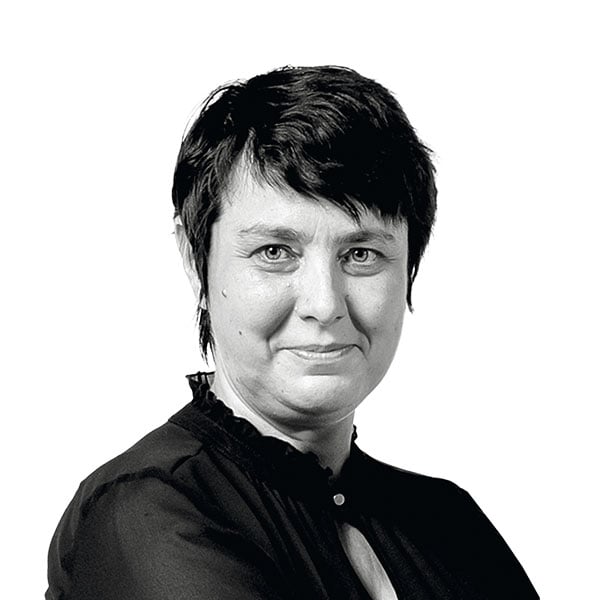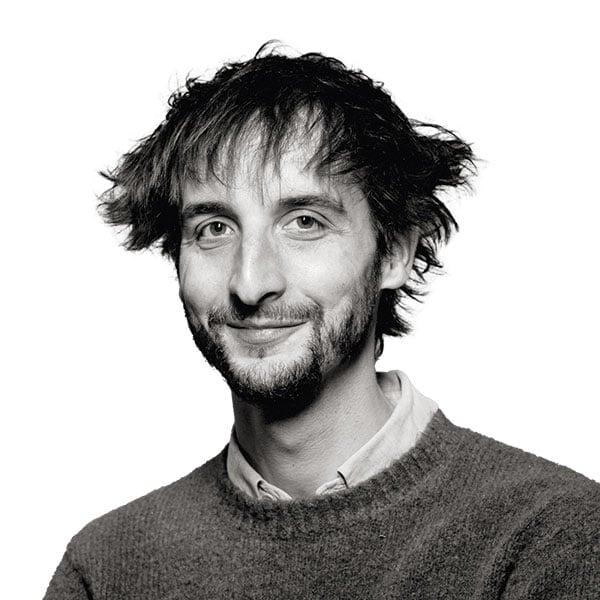‘I won’t be silenced. Never’
An incident with a notebook led to a wrongful accusation against a journalist. A form of legal harassment.

Corine de Vries
Editor-in-chief Mediahuis Nederland Regionale Dagbladen
A menswear shop in a small North Holland village along the coast went bankrupt. Our reporter passed it four weeks later and saw that the shop was suddenly open again, only now with home accessories in the window. Interesting, because no relaunch had been reported and the owner had large debts.
A good local reporter naturally goes to investigate. “Let’s not have this conversation over the phone,” said the partner of the owner, inviting him to go and visit. Once there, he’s offered a coffee, takes out his pen and notepad and asks his questions. The owner joins them, explaining how much the bankruptcy has affected him and how he isn’t ready for publicity yet. Suddenly, he jumps up, snatches the notebook from the journalist’s hands. He turns around and starts tearing the pages, ignoring requests to give it back. Our reporter wants his notebook, which includes notes from previous interviews. He grabs the owner by the shoulder and snatches it back.
The partner apologises and reiterates this a few days later when our boss gets in touch to discuss the incident. We decide to let the matter rest.
Two weeks later, the reporter gets a call from the police. He has to come in for questioning. Assault charges have been filed, “because you obviously dealt blows”. What follows are sleepless nights, discussions with a lawyer and a report to PersVeilig – this appears to be a new level of harassment.
And so an experienced reporter, with 40 years in regional journalism behind him, is made to feel anxious and insecure. However much we support and reassure him. According to the lawyer, the charge is definitely going to be dropped as there is a witness who fully supports his story. But subsequent to the interrogation, fingerprints and mugshots are taken. Our reporter feels humiliated and violated.
It's a new low in the ways journalists are physically and legally obstructed and threatened. A major threat to press freedom. Fortunately, our reporter is determined to keep taking out his pen and notepad. “I won’t be silenced. Never.”
Football club only wants to hear from cheerleaders
The directors and funders of Alemannia Aachen want to ban critical journalists from the stadium. Because they report the facts.

Thomas Thelen
Editor-in-chief Aachener Zeitung
Alemannia Aachen is a football club with a lot of tradition and a proud history. The most important club in the Aachen region, they played in the Bundesliga from 1967 to 1970 and in the 2006/07 season. In 2004 they even qualified for the Uefa Cup. With its Tivoli stadium, the club has a modern arena that can hold nearly 33,000 people. The team has since fallen down the sporting ladder and ended up at the bottom of Germany’s fourth division. And yet it is still a big topic for Medienhaus Aachen, a topic we follow closely with our usual critical journalistic eye.
But not everyone at Tivoli appreciates that critical oversight, especially now the team is finally playing successfully again and is currently sitting third in the table. When we reported in November that controls over fan access to the stadium were too lax, the chair of the supervisory board was not happy. We were accused of wanting to spoil the positive atmosphere that was finally being felt around the Tivoli after a long time.
It is a fact that the police have come down hard on those responsible for inadequate control at the entrance to the stadium. The consequence: fans using pyrotechnics without permission, throwing a cup at an assistant referee’s head, unauthorised entry on to the pitch and forcing a match to be abandoned. The regional football association has fined the club several times and said that it lacked “proper awareness of the problem”.
And those in charge at Alemannia? They chose media criticism instead of self-criticism. The chair of the board spoke publicly of “dubious rubbish” in relation to our reporting and publicly denounced our reporters by name. An influential club donor demanded the removal of our colleague on social media. According to him, Alemannia should make use of its rights to exclude representatives of Medienhaus Aachen from the stadium.
What about us? We will continue to do our job and report on Alemannia Aachen, despite the resistance of some officials at the club. Freedom of the press and of opinion are essential elements of a democracy.
Every journalist is on his guard here
In Northern Ireland, threats against journalists are commonplace. Sometimes investigative stories even have to be published without bylines.

Eoin Brannigan
Editor-in-chief Belfast Telegraph
When I worked in Dublin, I could remember exactly where I was when I got news of a single threat to one of my reporters. Here in Belfast I have lost count of such calls. Threats to journalists have become part of the publishing landscape in Northern Ireland and despite all the condemnation, and some attempts by the police to improve their own response, there is little indication that those responsible will be brought to justice.
It is an obvious point to make but when it comes to press freedom death threats are a fundamental barrier. We have real experience of journalists losing their lives in Northern Ireland, the Sunday World’s Martin O’Hagan among them. Almost four years ago Lyra McKee was shot dead at a riot in Derry. So these are not idle threats, there are people walking the streets of Northern Ireland prepared to act on them.
There are different levels of threat, and there is a suspicion that some of them are called in out of little more than spite, but nobody wants to be the editor who decides to write off any warning as baseless. They all must be taken seriously, which is a complicating factor to the job in Northern Ireland.
Other more sophisticated avenues are also employed to bully the press into inaction. Thankfully we have had more success in combating these attempts to silence us recently. This year the Sunday Life successfully challenged an injunction attempt from the alleged leader of the East Belfast UVF, Stephen Matthews, who tried to use the courts to prevent us naming him as the head of one of Northern Ireland’s biggest drugs gangs. Matthews, reportedly a millionaire, was surprisingly granted legal aid for his case.
The consequences of losing the case would have been serious, as it would have opened the way for paramilitaries and criminals of all backgrounds, often with legal aid and at no cost to themselves, to seek to gag us whenever they saw fit. But, with a lot of help from our legal team, we earned a significant victory in the battle for press freedom.
It was not our only victory either. In November the Sunday Life team won the Investigation Of The Year (Regional) award at the inaugural UK Media Freedom Awards, for its revelations about the South East Antrim UDA, one of Northern Ireland’s biggest crime gangs. Several threats against journalists have been traced back to this gang and any reports are published by the Sunday Life Investigations Team rather than under individual, identifiable bylines. Those who put the work into winning the award had to think twice about accepting it in public. Even moments of celebration are clouded by the difficult environment facing our journalists.

Long live the sin bin
Journalists can easily be sucked into the communication strategy of companies, sports clubs and politicians. In doing so, they limit their own freedom.

Liesbeth Van Impe
Editor-in-chief Nieuwsblad
Anyone who talks about press freedom usually addresses the Great Principles. The foundation of democracy, the most fundamental of fundamental rights, the alpha and omega of a democratic organisation of society... You only have to look around the world to see that press freedom is still hard-won, in both mature dictatorships and faltering democracies.
That press freedom is one that Western European newspapers write about, but rarely have to defend themselves. What a luxury. But it’s also a risk: those who only consider the Great Principles sometimes misjudge the much more subtle ways in which press freedom is chipped away at here.
What do you do about the football club that keeps the doors firmly shut and only offers a player for comment when it suits them – provided, of course, that you only ask the right questions and nothing is said about it? What about the celebrity who sees a newspaper as a platform to sell something, with managers who think an interview is something you can rewrite at will? Or the politician who will only talk on their own terms?
Particularly after the pandemic, we have to fight to retain the right to free news gathering. But too many PRs have since become accustomed to the fact that communication can be streamlined to an extreme degree. Those who refuse to go along with their long list of conditions end up in the sin bin. In the heyday of “access journalism”, this is the ultimate nightmare for many journalists.
It doesn’t have to be that way. Sometimes you have to embrace the sin bin. The perspective from there is often more interesting than if you obediently dance to their tune – even if you miss out on a “scoop” as a result. It’s exactly this freedom that our journalists and newsrooms have to defend every day.
Everybody wants press freedom – until it doesn’t suit them
Farmers protested this year to be heard. But journalists could no longer go out alone.

Sander Warmerdam
Editor-in-chief Leeuwarder Courant
Freedom of the press is the foundation of our democracy. Everyone seems to agree on that – when it suits them. Ministers choose to restrict the media when it comes to sensitive issues. Police prefer not to comment – unless they need our help. Ordinary people love to read about others, but no longer dare to have their own names in the paper, for fear of reactions on social media.
The mayor and councillors of Leeuwarden declared at an introductory meeting that nothing should be put in the way of the media. But when asked why their press office didn’t answer our questions, they remained silent. Press freedom has become an occasional argument.
Nor were the farmers who shut down our province last summer interested in facts, fair hearings or independent sources. The journalist asked questions, while the protesters mostly sought confirmation of their own story. Press freedom and press safety are an extension of each other. At the height of the protests, we didn’t feel it was responsible to send reporters out alone. They had to work in pairs, so they could keep an eye on each other. The farmers, contractors and supporters couldn’t care less about press freedom.
So it’s important to keep looking at the balance between press and freedom, including for our colleagues. Two ideas for starters for editors and publishers:
Press freedom: Allowing journalists more time to think, detached from the relentless rhythm of the press.
Push freedom: The sense of calm when your phone is switched off for a while. Precious moments with parents, children a movie or great food, where you’re not disturbed by a vibrating phone.
It’s more than just creative language play. Everything that happens affects our reporters. Under pressure from data, social media and the outside world, we’re asking more and more of them. They are constantly on. And the press can only be free when our people feel safe and free.
A politician may not abuse the law just because he doesn’t like an opinion
A Vlaams Belang politician uses legal action as a strategy against Gazet van Antwerpen.

Frederik De Swaef
Editor-in-chief Gazet van Antwerpen
Since the 2019 elections, Vlaams Belang has been polling almost constantly as Flanders’ largest party. The far-right party gained its first parliamentary seat in Antwerp in 1981 and until today the area provides the party leadership. That’s currently Tom Van Grieken from Schoten. I got to know the man better this year because he started demanding right of reply on editorials from Gazet Van Antwerpen.
It concerned a Standpunt column by political journalist Dirk Hendrikx, in which he describes how Vlaams Belang, on the one hand, tries to be worthy of government and, on the other, takes inspiration from the Hungarian leader Viktor Orbán. In another Standpunt, city reporter Patrick Van De Perre talked about an event in the Handelsbeurs in Antwerp, a gathering organised by Vlaams Belang of far-right parties from across Europe, where some controversial figures spoke. Van De Perre argued that a party that engages with people like that cannot be a candidate for government.
Van Grieken requested a right of reply each time, not because the reports were factually wrong, but because he believes that Vlaams Belang were unfairly portrayed in a bad light and that the party is “unfairly and inaccurately portrayed” in the Flemish press.
Gazet van Antwerpen respects the law and is always willing to correct mistakes, but reserves the right to express an opinion about a politician or a party in the newspaper and on the website without being reprimanded for doing so and without having to publish detailed rebuttals.
On asking Van Grieken what the intention is, it emerwged that these legal actions are a deliberate strategy. What will that mean if Vlaams Belang becomes the largest party at the next election? Or on the day they come to co-govern?